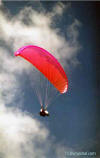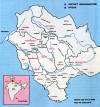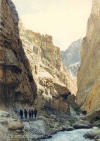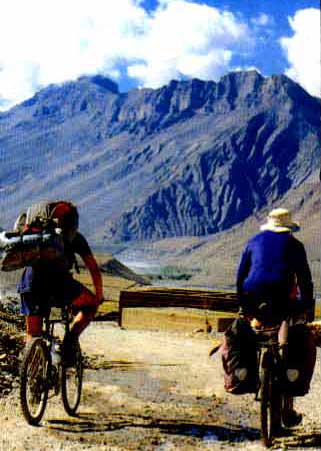|
TREKKING
The
main trekking areas in Himachal are the Dhauladhar and Pir Panjal ranges,
routes over the passes between the Shimla
region and the Kullu valley, the numerous treks out of Kullu and select
tracks in the Trans-HimaI-ayan regions of Kinnaur, lahaul and Spiti. Most
trekking areas are between 1 ,500 metres and 6,000 metres.
With
well over two hundred and seventy defined trails, the variation in terrain
is also enormous. low scrub-land and paths through paddy fields, give way
to trails strewn with pine needles. Then come woods of oak and flowering
rhododendron, which merge into forests of Himalayan cedar -'deodar' -.and
spruce. On most trails, small pastoral hamlets dot the way. Cunningly hidden
between the high mountains, are passes which were once known only to migrant
shepherds and dare-all traders. These lead the fabulous
wastes and
swift rivers of the arid Trans-Himalaya. A host of combinations and variations
take the trails through changing countryside. The degree of physical output
can also be changed to
suit
your requirements. For example, the same trek can be developed from a week
to last longer. Or, the two ends of a trek can be the same, but the trails
can be designed to be taxing, or gentle.
There
are several agencies that conduct treks. Guides, equipment, porters, pack
animals and maps are available at major starting points. The old Forest'dak
bungalows' that are strategically placed along many trek routes, add a considerable
measure of nostalgic charm and convenience for trekkers. Practically all
have an aura of the past, and lie nestled
in deep woods. In addition, the State Electricity Board and the PWD also
have rest houses. Most of these are marked
out on trekking maps and advance booking is possible. The Forest Rest Houses
are booked by the area's Divisional
Forest Officer (DFO), and the PWD and Electricity Board ones are booked
by the concerned Executive Engineer.
Training
facilities, with basic and intermediate courses are available at Manali's
Mountaineering Institute, and at its Regional Centres at Dharamsala and
Bharmour. Excellent camping facilities exist at these points.
More info on trekking
HELI-SKIING
For
high mountain thrills perhaps nothing can surpass the magic of heliskiing.
Under a deep blue sky, you are carried by helicopter to a snow-draped peak.
And after that there is nothing except steadily distancing whirr of rotor
blades, the sky and the snow. It is a thrilling experience as you rapidly
zoom down the slopes. The icy winds slap your face and the swiftly slithering
hiss of skis reminds you that you are racing away on your own steam.
The
sport is immediately available in the area bound by the Hanuman Tibba, Rohtang
Pass, Deo Tibba and Chanderkhani Pass -near the resort town of Manali.
A major feature is the compactness of the heli-skiing area. A sortie of
ten minutes can carry the skiers to the top of a 14,000 foot high slope.
More
Information on Heli-Skiing
SKIING
Kufri,
near Shimla is one of the oldest places in India to be associated with
skiing and the slopes are still in use during winter. Above Kufri, the
Mahasu ridge also has good scopes. Comprehensive facilities exist at Narkanda,
64km from Shim!a. There is a range of slopes, including a beginners' run,
an advanced slope and a slalom run. Himachal Tourism offers ski courses,
instruction and has equipment on hire at Narkanda.
At
Manali, the Directorate of Mountaineering and Allied Sports offers a variety
of courses and facilities for skiing in winter. Winter and summer skiing
are possible in the Solang area near Manali. Here are also some companies
in the private sector that offer ski courses and facilities.
CAMPING
Camping
is perhaps the best way of enjoying the wonders of nature given to Himachal
and sharing the warmth of its people. You can carry your own gear along
-or opt for any of the several camps that are pitched in various parts
of the state. These camps offer accommodation, catering and a variety of
activities like hikes, fishing, nature-tours and rafting. Most of these
offer quality facilities and services.
Himachal Tourism
has camp at Sarchu in Lahaul, and in addition to built- accommodation,tents
are available at Sangla and Kalpa in Kinnaur, and at Kaza in Spiti.
The Youth Hostel
Association of India, runs camps at Dalhousie and at Kullu- Manali. Camps run
by the private sector are in the Baspa (Sangla) valley and at Kalpa in Kinnaur,
at Tabo in Spiti, at AlHilal (Taragarh) and Dharamsala in Kangra, at Shoja
near Kullu, and at Mashobra and Baldian near Shimla. Adventure camps are
likely to be available soon in the Pabbar valley, in the Jubbal- Hatkoti-Rohru
area.
ICE-SKATING
The
Shimla ice-skating rink has the largest open-air area with naturally frozen
ice in this part of the world. And the Ice Skating Club has alrea dy
celebrated
its Diamond Jubilee. Ice-skating normally begins in early December and carries
on to February. Clear skies and low temperatures can provide a series of
uninterrupted sessions. There are two sessions every day, in the morning
and again in the evening. Memberships are available for the 'season' as
well as for shorter terms -and even for single sessions. Skates are also
available at the rink.
Fancy-dress
carnivals, 'gymkhanas', ice-hockey and dances enliven every season.
PARA-GLIDING
Riding
the warm thermal currents of the air, is perhaps the closest man has ever
come to sailing the skies as free as a bird. Almost at will, you dip and
wheel high over the hills and valleys. The bald peak of Billing,
above the Buddhist monastery of Bir in Kangra, has been the venue for five
national and three
 international hang-gliding rallies since 1984. The site
is perfect for para-gliding too. And this sport is a mix of sky-diving
and hang-gliding. A fairly recent sport that is steadily gaining popularity,
para-gliding is possible at various places in the state. Places where para-gliding
is done regularly are -Bundla Dhar near Bilaspur, in the Kullu valley and
at Intkali in the Pabbar valley near Rohru. international hang-gliding rallies since 1984. The site
is perfect for para-gliding too. And this sport is a mix of sky-diving
and hang-gliding. A fairly recent sport that is steadily gaining popularity,
para-gliding is possible at various places in the state. Places where para-gliding
is done regularly are -Bundla Dhar near Bilaspur, in the Kullu valley and
at Intkali in the Pabbar valley near Rohru.
Himachal
Tourism sponsors training programmes and events at various times of the
year, in different places. There is an Adventure Sports Hostel at Dharamsala
and an Aero Sports Complex at Bir. For details of training facilities,
contact sports associations, or the Divisional Tourism Development
Officers of Himachal Tourism.
Hang Gliding –The Spirit of Adventure
SPORTSMEN all over the world are looking for
something different. With conventional sport having lost their initial
challenge, the adventurous are experimenting with different, arduous and
risky games that wil reinstil the spirit of adventure in modern day sport.
Even as people are taking to trekking, hiding
and skiing with a zest there is a small group of dare- devils that are
looking for extra. For those few, hang gliding is just what the doctor
ordered.
A few spirals of springy metal, some wire
attached to a couple of levers. All bolted onto a frame made up of steel
pipes. And a piece of cloth over it as the final touch. That's all that
goes into one of the things that these daring few strap onto their backand plunge off the steepest cliff they can find in the neighbourhood. First
seen-almost disbelievingly-almost 20 years ago in faraway America, people
in India have also risen to the challenge of doing something different.
Transporting the flimsy rig to a hilltop, all you have to do is to strap
yourself in, get a bearing of the wind direction-not too tough, and just
watch the birds-and take the plunge. A few steps and off you go. Soaring
on the currents, as free as the birds. From then on, it's just you and
the glider. Manipulating the currents that criss-cross the surface of the
earth, taking maximum advantage of one stream only to switch and gently
waft into the heights. There is no engine to keep in trim, no fuel costto
worry about. All you need is your glider and your daring.
First seen in India almost
two decade ago,
hang gliding was brought to the Western Ghats by Bombay's Deepak Mahajan
and Armyman Mundukar who had a lot of help from Neil Kinnier. Even as people
feasted on the beauty of the Dhauladhar ranges in the Western Himalayas
a veritable paradise for mountain climbers, trekkers and hikers-an innovative
foreigner took off from Triund for the first Indian flight. Very popular
with trekkers, Triund was not the ideal place for hang gliding. Some time
later. Enthusiasts discovered the Kangra Valley in Himachal Pradesh to
be the best-suited place to practice their daring sport.
Set at an attitude of 8,000 feet above sea level and about 90 km from Dharamsala
Billing is chosen as the ideal' place to launch the sport with the First
World Himalayan Hang Gliding Rally. Since thesix national and three
international hang gliding rallies have been organised at Billing. The best
time for hang gliding is May-June and September-October when the temperature
is moderate and thermal effect are extremely good. Billing in Kangra district,
Bundla Dhar in Bilaspur and Kullu Valley are ideal locations. Billing is
described as one of the best launch site in the world. It offer opportunities
for high attitude and cross country gliding for more than 200 km. Billing
commands panoramic view of Kangra Valley and snow covered ranges of Dhauladhar
mountain and valley below offers a safe land ground at Bir.
ANGLING
An
anglers' paradise, Himachal has several spots for both trout and mahaseer
-as well as other fish. Acclaimed as the best sport fish in the world, both
Brown and Rainbow Trout are to be found in Himachal's streams. Up-
stream of Rohru in the Pabbar valley, there are several spots ideal for
fishing. Chirgaon has the trout hatchery, and other sites are -Seema, Mandil,
Sandasu, Tikri and Dhamvari; all are within 5 to 25km of Rohru. Kinnaur's
Baspa river in the Sangla valley also holds trout. The fish also abounds
in the Uhl river near Barot. Good spots on this beat are -Luhandi, the
Puran hachery, Tikkar and Kamand. The upper reaches of the river Beas in
the Kullu valley, and its side streams like the Sarvari, Parbati, Sainj,
Hurla and Tirthan - especially the areas around Aut, Patlikuhf, Katrain,
Raison and Largi -are excellent for the sport. These are all the up-stream
of the Pandoh reservoir and are close to, or on the Mandi -Manali highway.
The
picturesque Kangra valley has several spots that offer mahaseer -river
carp. The reservoir of the Pong Dam right up to the town of Dehra has good
spots. The area around Nadaun along the river Beas has some good beats,
and some are Chamba Pattan near Garli (accessible from Nadaun or Jwalamukhi),
Amtar (2km from Nadaun), Harsi Pattan (30km from Tira Sujanpur) and Lambagaon
(15km from Tira Sujanpur). On the river Giri, Gaura (30km from Solan on
the Rajgarh road) and the beat near Dadahu (5km from Renuka Lake) and the
river
Yamuna, downstream of Paonta Sahib are good spots for mahaseer. The
waters of the Gobind Sagar near Bilaspur, also have a variety of fish.
Fishing fees are nominal. The trout fishing season is from 31 March to
31 October. Generally, the best months for mahaseer are those that have
an 'r' in their spelling -January, Feburary, March, April, September, October,
November and December.
WATER
AND RIVER SPORTS
The
Pong Dam reservoir in Kangra, and its 42km length and 2km breadth, offers
a variety of activities in close collaboration with the Directorate of
Mountaineering and Allied Sports. Year- long activities include swimming,
water- skiing, surfing, kayaking, rowing, canoeing and sailing. Three levels
of courses are also conducted -beginner, intermediate and advanced. Similar
activities are also available on the waters of the Gobind Sagar near Bilaspur,
the Chamera lake near Dalhousie and the Pandoh lake on the Mandi-Kullu
National Highway. include swimming,
water- skiing, surfing, kayaking, rowing, canoeing and sailing. Three levels
of courses are also conducted -beginner, intermediate and advanced. Similar
activities are also available on the waters of the Gobind Sagar near Bilaspur,
the Chamera lake near Dalhousie and the Pandoh lake on the Mandi-Kullu
National Highway.
River-rafting
-or white-water rafting, as it is also called -is swiftly making Himachal
a focus for the sport. For a torrent of adrenalin to gush through every
vein and surge over every muscle, you can race over the State's river rapids
in an inflatable rubber dinghy. The sport is now being held on the Sutlej
near Shimla, on the Beas near Kullu, the Ravi near Chamba and the Chandra
in Lahaul. Possibilities are also being explored on the river Spiti. Non
swimmers and novices can also experience this on some of the gentler rapids.
The sport takes a break during winter and in portions of the monsoons.
Himachal
Tourism sponsors courses in river rafting, and there are operators in the
private sector who offer this experience.
MOUNTAIN
CYCLING
Gear yourself for high adventure with an
expedition on cycles. You can pedal your way past high passes or simply,
make a day-adventure. Quite literally, the whole of Himachal is your playground.
The tour can be coupled with camping and can be carried on for several
weeks over diverse terrain. The lower regions of the State- Kangra, Una,
Hamirpur and Bilaspur - offer gentle routes. Or you can stretch mind, muscle
and stamina to reach out to the Trans Himalayan tracts of Lahaul, Spiti
and Kinnaur. Milder -but no less interesting -excursions can be done out
of any holiday station.For the higher regions, the summer and autumn months
are suggested.
By
jeep, car or on motorcycle, you can explore the variety Himachal has to
offer. By jeep, the Trans Himalayan tracts can steadily unfold their natural
and man-made wonders. Along one of the world's highest highways, you can
drive out of Manali, cross the Rohtang pass (3980m), and move through arid
Lahaul to Leh and Ladakh. From Shimla, through picturesque Kinnaur, you
drive through the haunting landscapes of Spiti -and over the Kunzam pass
(4551 m), enter Lahaul. Himachal has an extensive network of roads and
tracks-and apart from the routes mentioned above, there are several others
you can traverse on. By car, driving over the more demanding routes may
not be possible, but in no way does this curtail the range of experience.
And motorcycles may impose some limitations, but are again a wonderful
way of sharing the wonders of Himachal.All you have to do is buy a route
map, plan your trip -and you are on your way.
MOUNTAINEERING
AND ROCKCLIMBING
Rock
climbing is often seen as the basic stage for mountain climbing. Yet, it
may also be treated as an independent sport, where its most basic level
is climbing a rock face, using only hands and feet - and a safety rope.
The area around Manali, presently forms the core of mountaineering in Himachal.
The Beas Kund region and lower reaches of the Hanuman Tibba (5930m), the
Manali and Shitidhar peaks around the source of the river Beas, and the
Deo Tibba (6001 m) area, are suggested for beginners with some experience.
The Chandra Bhaga ranges, the Pir Panjal and Dhauladhar ranges are an existing
focus. The state also has several other areas where mountaineering is possible.
The Institute of Mountaineering and Allied Sports at Manali, and its branch
at Dharamsala, offer the activity. Courses are also available with the
Institute.
OTHER
ACTIVITIES
Himachal
also hosts a Winter Festival and Snow Carnival. Tobogganing is possible
in winter. Various water sports competitions are also hosted. Especially
during the monsoons, at Naldehra, several golf tournaments take place.
Angling and para-gliding competitions are also hosted in the state.
TREKKING
-AN EQUIPMENT CHECKLIST
Comfortable
walking boots with a good grip on the ankles. Waterproof warm jacket. Woollen/tennis
socks and stockings" Personal toiletries and clothes.
Sunglasses.
Headgear. Rucksack-other bags too if you plan to hire ponies and porters.
Water bottle. Swiss army knife. Sleeping bag and foam
ground sheet. Gloves, Umbrella, Rope, Medical and first aid
equipment. Photographic equipment- including a UV filter.
Torch and batteries. Tent, Compass, Binoculars,
Coo"king gas ctyinders with attached stoves or kerosene ones. Food
and rations. Fresh fruit, vegetables and milk are rarely in short supply
along the trails -apart from the higher reaches and parts of the Trans-
Himalaya.
FOREST
REST HOUSES
There
are over five hundred 'rest houses' and 'inspection huts' that are maintained
by the State's Forest Department. Many lie on trek routes and their facilities
can be utilised by visitors. In District Kinnaur, these are at- Nichar,
Tranda, Chaura, Shaltu, Kilba, Sangla, Shongtong, Purbani, Akpa, Giabong
and Rupi. In District Lahaul-Spiti, these are at - Kaza, Udaipur, Jahalman,
Tabo, Sumdo and Sagnam. Bookings are done by the local Divisional Forest
Officers whose postal addresses can be obtained.
Most
of the areas that offer adventure sports are ecologically fragile. Please
do not leave non-bio-degradable material like plastic bags and metal cans
behind.
While
every effort has been made to keep this document accurate,we don’t accept
any responsibility for any change or inadvertent error. Many sports mentioned
above require a level of fitness, expertise, suitable equipment and coaching.
This Information is an introduction to various adventure activities possible
or available in Himachal and We advises you to thoroughlycheck
every aspect before participating in any of the activities mentioned above
and accepts no liability that may arise from it:
|









